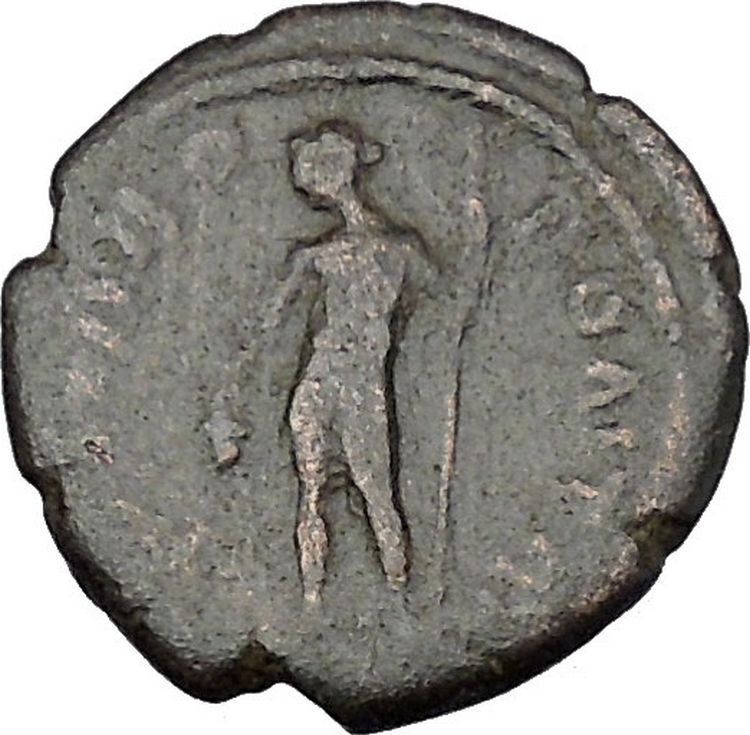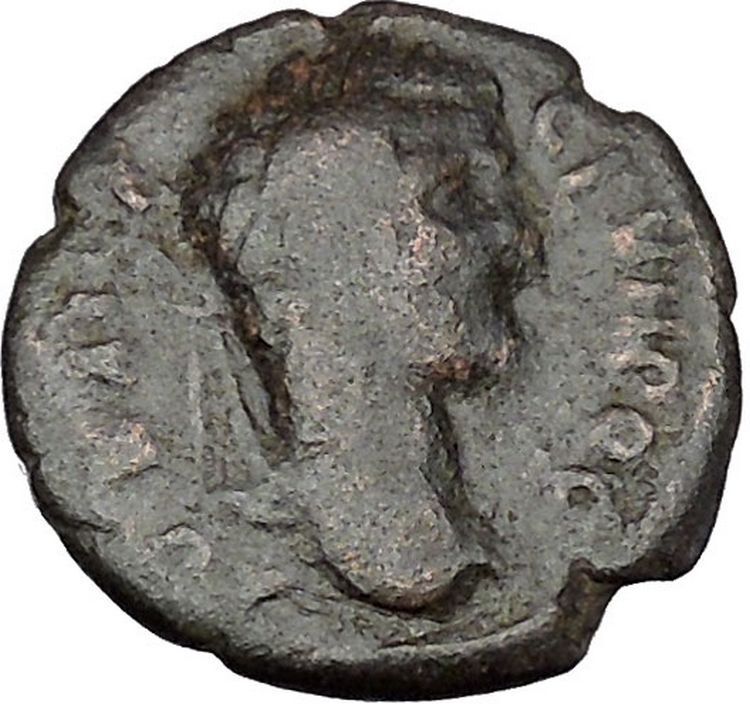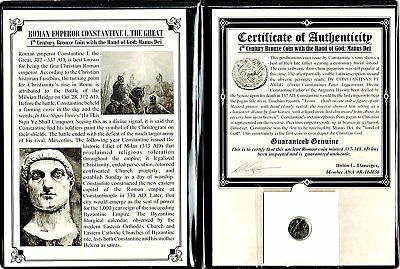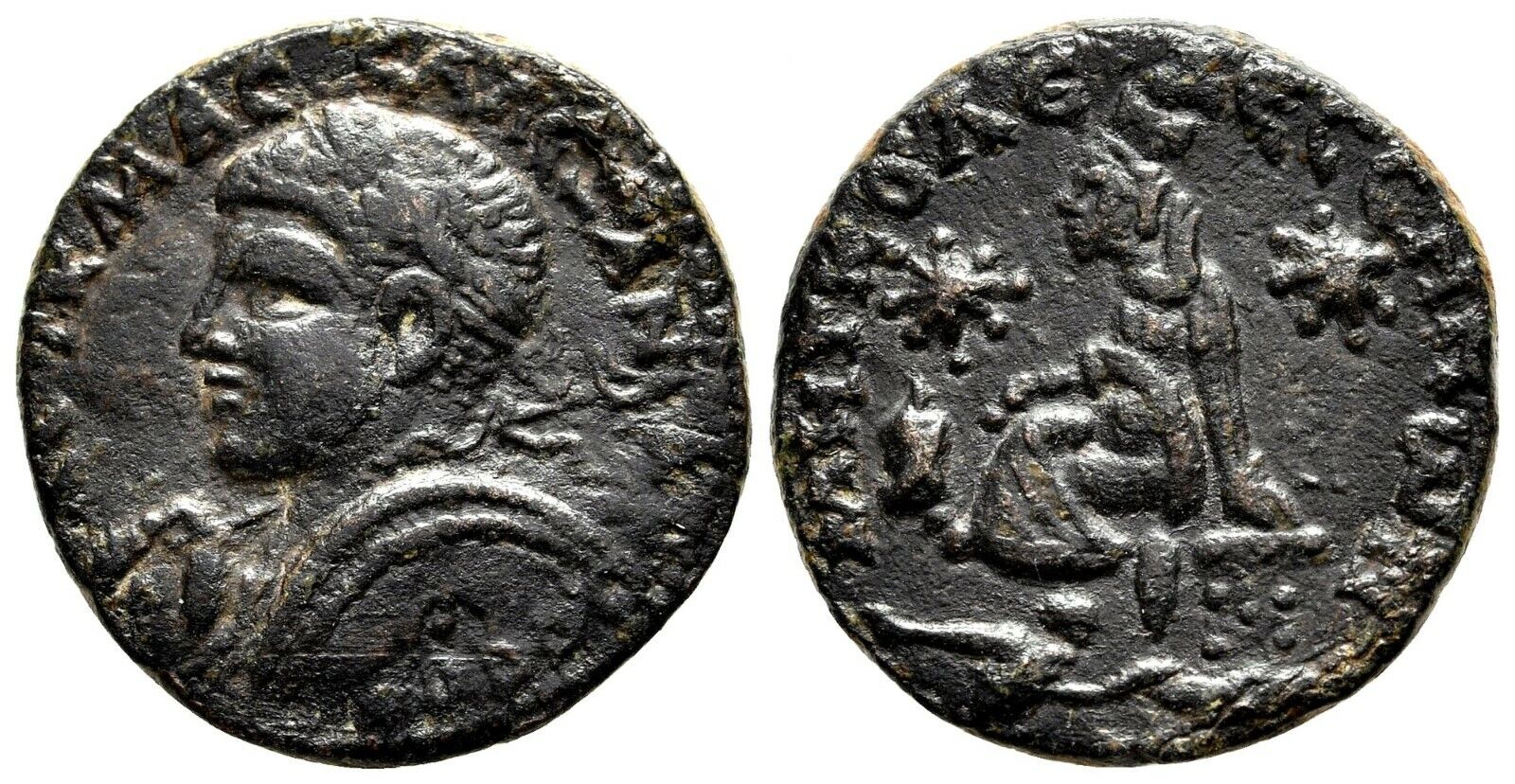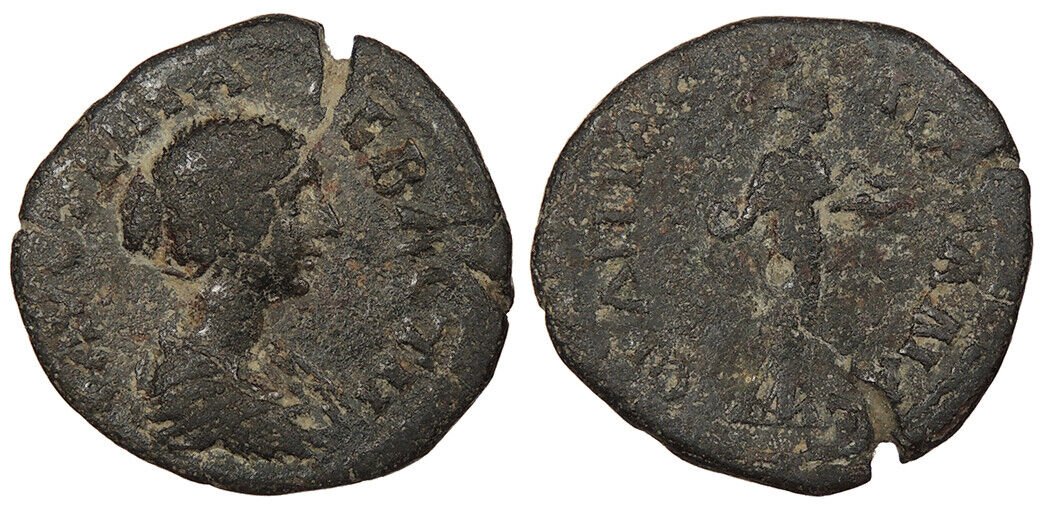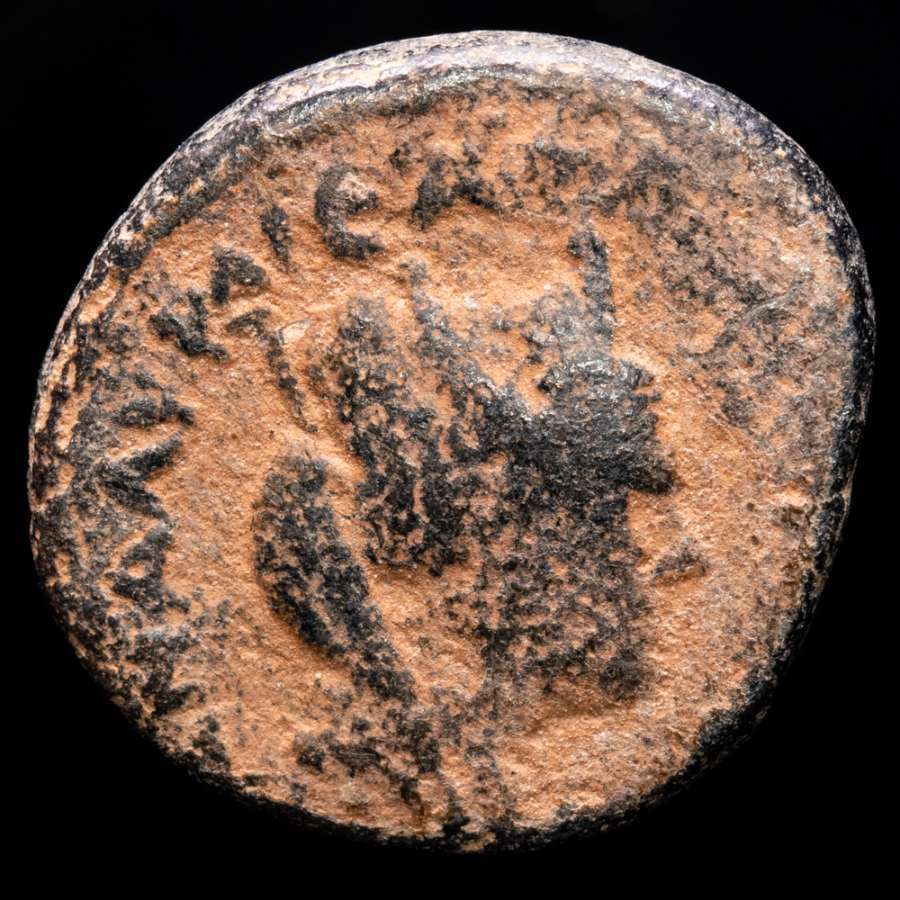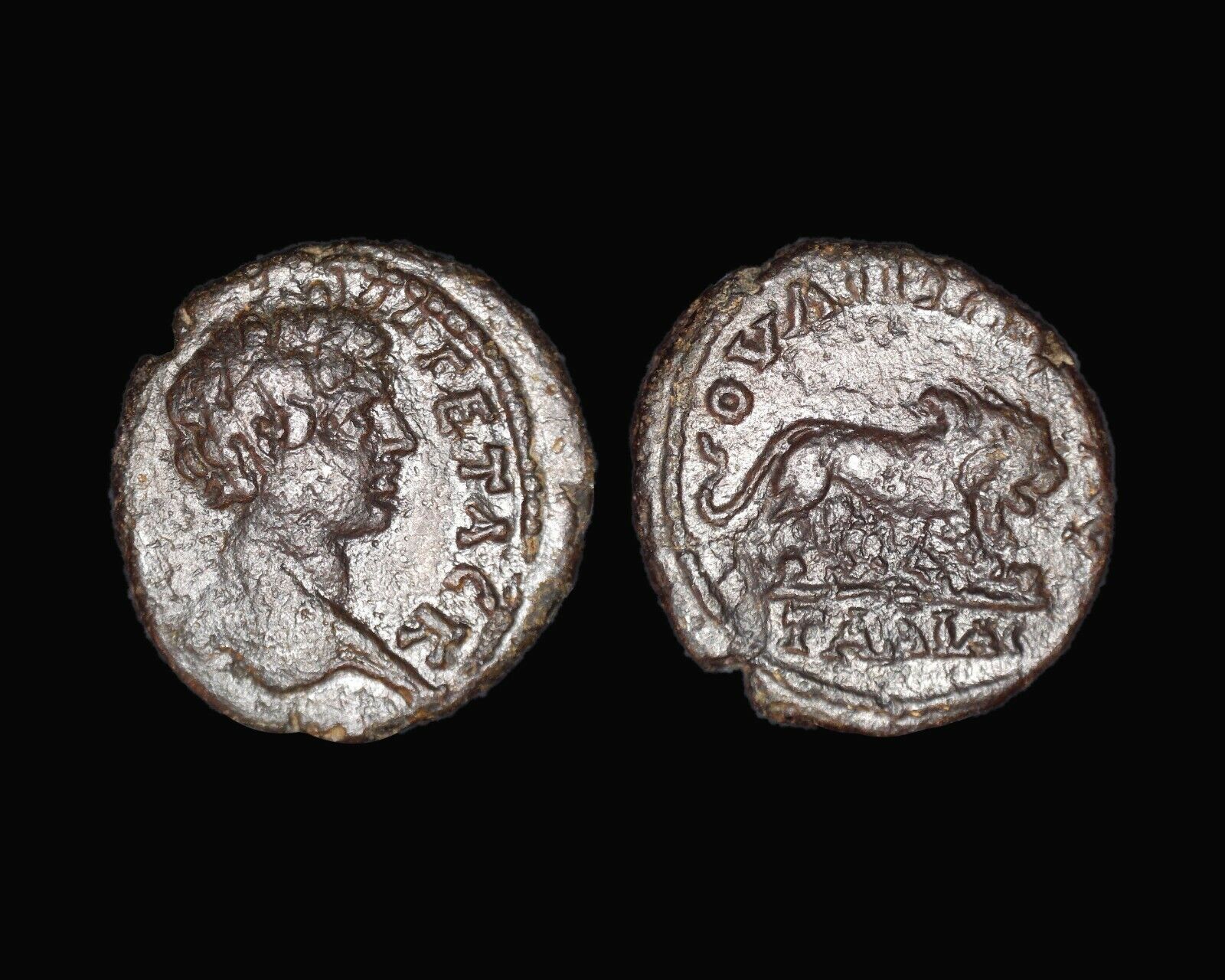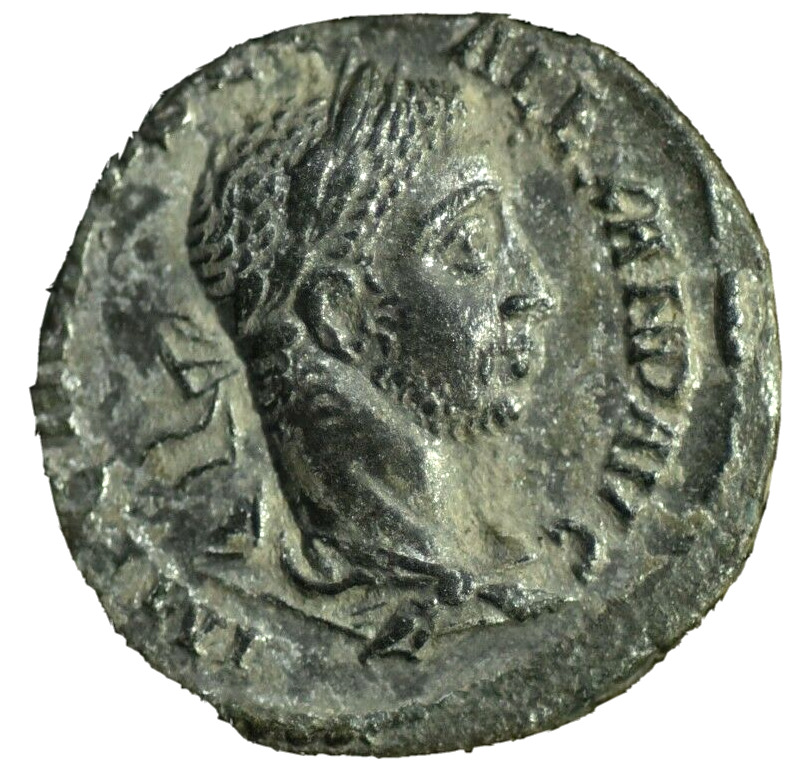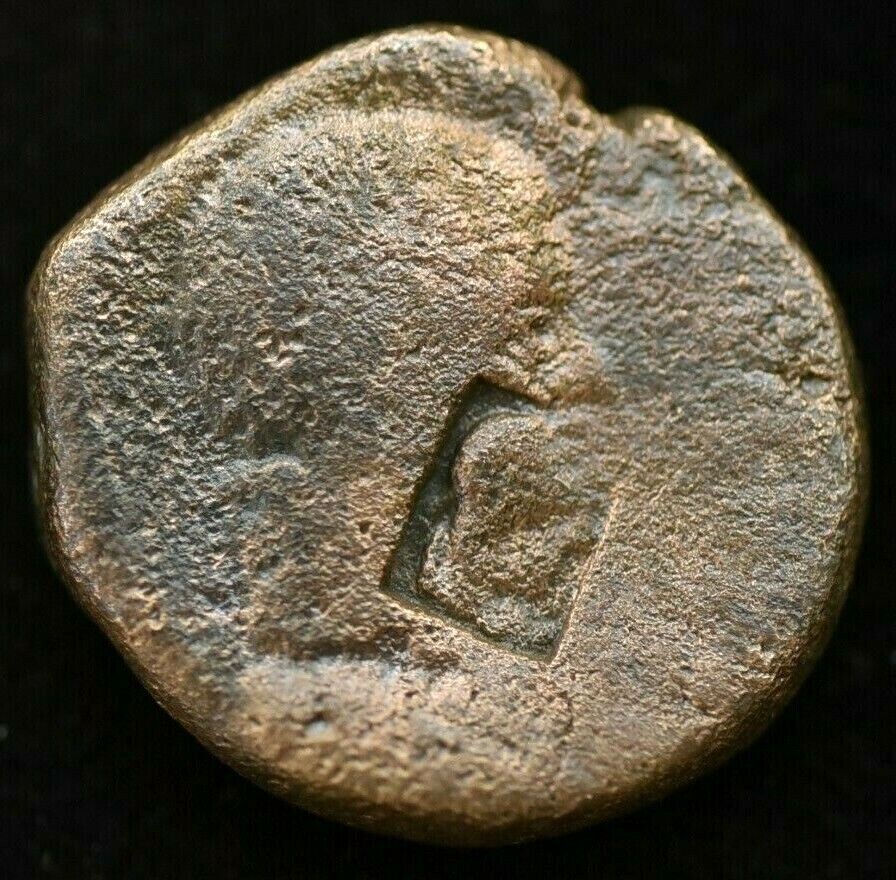-40%
SEPTIMIUS SEVERUS Rare Philippopolis in Thrace Ancient Roman Coin Bacchus i48481
$ 26.4
- Description
- Size Guide
Description
Item:i48481
Authentic Ancient Coin of:
Septimius Severus
-
Roman Emperor
: 193-211 A.D. -
Bronze 19mm (3.66 grams)
Philippopolis in Thrace
AV KAI CE CEVHPOC, Laureate head right.
ΦΙΛΙΠΠΟΠΟΛΙΤΩΝ, Dionysus standing left, holding thyrsos and bunch of grapes. .
You are bidding on the exact item pictured, provided with a Certificate of Authenticity and Lifetime Guarantee of Authenticity.
Dionysus
is the god of the grape harvest, winemaking and wine, of ritual madness, fertility, theatre and religious ecstasy in
Greek mythology
. Alcohol, especially
wine
, played an important role in Greek
culture with Dionysus being an important reason for this life style. His name, thought to be a
theonym
in
Linear B
tablets as
di-wo-nu-so
(
KH
Gq 5 inscription), shows that he may have been worshipped as early as c. 1500–1100 BC by
Mycenean Greeks
; other traces of the Dionysian-type cult have been found in ancient
Minoan Crete
. His origins are uncertain, and his cults took many forms; some are described by ancient sources as Thracian, others as Greek. In some cults, he arrives from the east, as an Asiatic foreigner; in others, from
Ethiopia
in the South. He is a god of
epiphany
, "the god that comes", and his "foreignness" as an arriving outsider-god may be inherent and essential to his cults. He is a major, popular figure of
Greek mythology
and
religion
, and is included in some lists of the
twelve Olympians
. Dionysus was the last god to be accepted into Mt. Olympus. He was the youngest and the only one to have a mortal mother. His festivals were the driving force behind the development of
Greek theatre
. He is an example of a
dying god
.
The earliest cult images of Dionysus show a mature male, bearded and robed. He holds a
fennel
staff, tipped with a pine-cone and known as a
thyrsus
. Later images show him as a beardless, sensuous, naked or half-naked androgynous youth: the literature describes him as womanly or "man-womanish". In its fully developed form, his central cult imagery shows his triumphant, disorderly arrival or return, as if from some place beyond the borders of the known and civilized. His procession
(
thiasus
)
is made up of wild female followers (
maenads
) and bearded
satyrs
with
erect penises
. Some are armed with the
thyrsus
, some dance or play music. The god himself is drawn in a chariot, usually by exotic beasts such as lions or tigers, and is sometimes attended by a bearded, drunken
Silenus
. This procession is presumed to be the cult model for the human followers of his
Dionysian Mysteries
. In his
Thracian
mysteries, he wears the
bassaris
or
fox
-skin, symbolizing a new life. Dionysus is represented by city religions as the protector of those who do not belong to conventional society and thus symbolizes everything which is chaotic, dangerous and unexpected, everything which escapes human reason and which can only be attributed to the unforeseeable action of the gods.
Also known as
Bacchus
, the name adopted by the
Romans
and the frenzy he induces,
bakkheia
. His
thyrsus
is sometimes wound with ivy and dripping with honey. It is a beneficent wand but also a weapon, and can be used to destroy those who oppose his cult and the freedoms he represents. He is also called
Eleutherios
("the liberator"), whose wine, music and ecstatic dance frees his followers from self-conscious fear and care, and subverts the oppressive restraints of the powerful. Those who partake of his mysteries are possessed and empowered by the god himself. His cult is also a "cult of the souls"; his maenads feed the dead through blood-offerings, and he acts as a divine communicant between the living and the dead.
In Greek mythology, he is presented as a son of
Zeus
and the mortal
Semele
, thus semi-divine or
heroic
: and as son of Zeus and
Persephone
or
Demeter
, thus both fully divine, part-
chthonic
and possibly identical with
Iacchus
of the
Eleusinian Mysteries
. Some scholars believe that Dionysus is a
syncretism
of a local Greek nature deity and a more powerful god from
Thrace
or
Phrygia
such as
Sabazios
or
Zalmoxis
.
In
Greek mythology
, a
thyrsus
or
thyrsos
(
Greek
:
θύρσος
) was a staff of
giant fennel
(
Ferula communis
) covered with
ivy
vines and leaves, sometimes wound with
taeniae
and always topped with a
pine
cone
. These staffs were carried by
Dionysus
and his followers.
Euripides
wrote that
honey
dripped from the thyrsos staves that the
Bacchic
maenads
carried.The thyrsus was a sacred instrument at religious rituals and
fêtes
.\
Symbolism
The thyrsus, associated with
Dionysus
(or Bacchus) and his followers, the
Satyrs
and
Maenads
, is a symbol of
prosperity
,
fertility
,
hedonism
, and pleasure/enjoyment in general. It has been suggested that this was specifically a fertility
phallus
, with the fennel representing the shaft of the penis and the pine cone representing the "seed" issuing forth. The thyrsus was tossed in the Bacchic dance:
Pentheus
: The thyrsus— in my right hand shall I hold it?
Or thus am I more like a Bacchanal?
Dionysus
: In thy right hand, and with thy right foot raise it"
Sometimes the thyrsus was displayed in conjunction with a
kantharos
wine cup, another symbol of Dionysus, forming a male-and-female combination like that of the royal scepter and orb.
Literature
In the
Iliad
,
Diomedes
, one of the leading warriors of the
Achaeans
, mentions the thyrsus while speaking to
Glaucus
, one of the
Lycian
commanders in the
Trojan
army, about
Lycurgus
, the king of
Scyros
:
He it was that/drove the nursing women who were in charge/of frenzied Bacchus through the land of Nysa,/and they flung their thyrsi on the ground as/murderous Lycurgus beat them with his ox-/goad. (
Iliad
, Book VI.132-37)
The thyrsus is explicitly attributed to Dionysus in
Euripides
's play
The Bacchae
as part of the costume of the Dionysian cult.
...To raise my Bacchic shout, and clothe all who respond/ In fawnskin habits, and put my thyrsus in their hands–/ The weapon wreathed with ivy-shoots..." Euripides also writes, "There's a brute wildness in the fennel-wands—Reverence it well." (
The Bacchae and Other Plays
, trans. by Philip Vellacott, Penguin, 1954.)
Socrates
writes in
Phaedo
:
I conceive that the founders of the mysteries had a real meaning and were not mere triflers when they intimated in a figure long ago that he who passes unsanctified and uninitiated into the world below will live in a slough, but that he who arrives there after initiation and purification will dwell with the gods. For "many," as they say in the mysteries, "are the thyrsus bearers, but few are the mystics,"--meaning, as I interpret the words, the true philosophers.
In Part II of
Johann Wolfgang von Goethe
's
Faust
,
Mephistopheles
tries to catch a
Lamia
, only to find out that she is an illusion:
Well, then, a tall one I will catch.../And now a thyrsus-pole I snatch!/Only a pine-cone as its head. (7775-7777)
Sookie Stackhouse notes the thyrsus carried by the maenad in the 2nd book of
The Southern Vampire Mysteries
.
She idly waved the long wand with the tuft on the end. It was called a thyrsis [
sic
]; I’d looked maenad up in the encyclopedia. Now I could die educated. (Harris, Charlaine (2006-09-01). "Living Dead in Dallas: A Sookie Stackhouse Novel"}
Gallery
A Bacchant holding a thyrsus:
Malice
, by
William-Adolphe Bouguereau
, 1899
Roman relief showing a Maenad holding a thyrsus (
Prado
,
Madrid
).
Bacchus Triumphant
(1882)
by
John Reinhard Weguelin
A Maenad uses her thrysos to ward off a Satyr,
Attic red-figure
kylix
, circa 480 BC
Plovdiv
(
Bulgarian
:
Пловдив
) is
the second-largest city
in
Bulgaria
with a population of 380,683. Plovdiv's history spans some 6,000 years, with traces of a Neolithic settlement dating to roughly 4000 BC. It is the administrative center of
Plovdiv Province
in southern Bulgaria and three municipalities (Plovdiv,
Maritsa
and
Rodopi
) and Bulgaria's
Yuzhen tsentralen
planning region (NUTS II), as well as the largest and most important city in
Northern Thrace
and the wider international historical region of
Thrace
. The city is an important economic, transport, cultural and educational center.
Known in the West for most of its history by the
Greek
name
Philippopolis
, it was originally a
Thracian
settlement before becoming a major
Roman
city. In the Middle Ages, it retained its strategic regional importance, changing hands between the
Byzantine
and
Bulgarian Empires
. It came under
Ottoman
rule in the 14th century. In 1878, Plovdiv was made the capital of the autonomous Ottoman region of
Eastern Rumelia
; in 1885, it became part of Bulgaria with the
unification
of that region and the
Principality of Bulgaria
.
Plovdiv is situated in the southern part of the Plovdiv Plain on the two banks of the
Maritsa River
. The city has historically developed on seven
syenite
hills, some of which are 250 m high. Because of these seven hills, Plovdiv is often referred to in Bulgaria as "The City of the Seven Hills".
There are many remains preserved from
Antiquity
such as the
Ancient amphitheatre
, Roman odeon,
Roman Stadium
, the archaeological complex
Eirene
and others.
Plovdiv was given various names throughout its long history. It was originally a
Thracian
settlement by the name of
Eumolpias
.
Philip II of Macedon
conquered the area in 342-341 BC and renamed the city
Philippoupolis
(
Greek
:
Φιλιππούπολις
), of which the later Thracian name for the city,
Pulpu-deva
, is a reconstructed translation. After the Romans took control of the area, the city was named
Latin
:
Trimontium
, meaning the Three Hills. During the Middle Ages the city was known as Philippoupolis in
Byzantine Greek
and
Paldin
(Пълдин) or
Plavdiv
(Плъвдив) in
Old Bulgarian
, variations of the town's earlier
Thracian
name. The city was known as Philippopolis in Western Europe well into the early 20th century. The city was known as
Filibe
in
Turkish
during the
Ottoman Empire
.
Plovdiv has settlement traces dating from the Neolithic, roughly 4000 BC. Archaeologists have discovered fine pottery and other objects of everyday life from as early as the Neolithic Age, showing that in the end of the 4
th
millennium B.C. there already was an established settlement there. According to
Ammianus Marcellinus
, Plovdiv's written post-Bronze Age history lists it as a
Thracian
fortified settlement named Eumolpias. In 4th century BC the city was a centre of a trade fair (called
panegyreis
). In 342 BC, it was conquered by
Philip II of Macedon
, the father of
Alexander the Great
, who renamed it "Φιλιππόπολις",
Philippopolis
or "the city of Philip" in his own honour. Later, it was reconquered by the
Thracians
who called it
Pulpudeva
(a reconstructed translation of Philipopolis)
In 72 AD it was seized by the Roman general Terentius Varo Lukulus and was incorporated into the
Roman Empire
, where it was called
Trimontium
(
City of Three Hills
) and served as metropolis (capital) of the province of
Thrace
. It gained a city status in late 1st century. Trimontium was an important crossroad for the Roman Empire and was called "The largest and most beautiful of all cities" by
Lucian
. Although it was not the capital of the Province of Thrace, the city was the largest and most important centre in the province. In those times, the
Via Militaris
(or
Via Diagonalis
), the most important military road in the
Balkans
, passed through the city.
"This [Plovdiv] is the biggest and loveliest of all cities. Its beauty shines from faraway..."
Roman writer
Lucian
.
The Roman times were a period of growth and cultural excellence. The ancient ruins tell a story of a vibrant, growing city with numerous public buildings, shrines, baths, and theatres. The city had an advanced water system and
sewerage
. It was defended with a double wall. Many of those are still preserved and can be seen by tourists. Today only a small part of the ancient city has been excavated.
L
ucius Septimius Severus
(or rarely
Severus I
) (April 11, 145/146-February 4, 211) was a
Roman
general, and
Roman Emperor
from April 14, 193 to 211. He was born in what is now the
Berber
part of Rome's historic
Africa Province
.
Septimius Severus was born and raised at
Leptis Magna
(modern
Berber
, southeast of
Carthage
, modern
Tunisia
). Severus came from a wealthy, distinguished family of
equestrian
rank. Severus was of
Italian
Roman ancestry on his mother's side and of
Punic
or
Libyan
-Punic ancestry on his father's. Little is known of his father,
Publius Septimius Geta
, who held no major political status but had two cousins who served as consuls under emperor
Antoninus Pius
. His mother, Fulvia Pia's family moved from
Italy
to
North Africa
and was of the
Fulvius
gens, an ancient and politically influential clan, which was originally of
plebeian
status. His siblings were a younger
Publius Septimius Geta
and Septimia Octavilla. Severus’s maternal cousin was
Praetorian Guard
and consul
Gaius Fulvius Plautianus
.
In 172, Severus was made a
Senator
by the then emperor
Marcus Aurelius
. In 187 he married secondly
Julia Domna
. In 190 Severus became
consul
, and in the following year received from the emperor
Commodus
(successor to Marcus Aurelius) the command of the
legions
in
Pannonia
.
On the murder of
Pertinax
by the troops in 193, they proclaimed Severus Emperor at
Carnuntum
, whereupon he hurried to Italy. The former emperor,
Didius Julianus
, was condemned to death by the Senate and killed, and Severus took possession of Rome without opposition.
The legions of
Syria
, however, had proclaimed
Pescennius Niger
emperor. At the same time, Severus felt it was reasonable to offer
Clodius Albinus
, the powerful governor of Britannia who had probably supported Didius against him, the rank of Caesar, which implied some claim to succession. With his rearguard safe, he moved to the East and crushed Niger's forces at the
Battle of Issus
. The following year was devoted to suppressing Mesopotamia and other Parthian vassals who had backed Niger. When afterwards Severus declared openly his son
Caracalla
as successor, Albinus was hailed emperor by his troops and moved to Gallia. Severus, after a short stay in Rome, moved northwards to meet him. On
February 19
,
197
, in the
Battle of Lugdunum
, with an army of 100,000 men, mostly composed of
Illyrian
,
Moesian
and
Dacian
legions, Severus defeated and killed Clodius Albinus, securing his full control over the Empire.
Emperor
Severus was at heart a
soldier
, and sought glory through military exploits. In 197 he waged a brief and successful war against the
Parthian Empire
in retaliation for the support given to Pescennius Niger. The Parthian capital
Ctesiphon
was sacked by the legions, and the northern half of
Mesopotamia
was restored to Rome.
His relations with the
Roman Senate
were never good. He was unpopular with them from the outset, having seized power with the help of the military, and he returned the sentiment. Severus ordered the execution of dozens of Senators on charges of corruption and
conspiracy
against him, replacing them with his own favorites.
He also disbanded the
Praetorian Guard
and replaced it with one of his own, made up of 50,000 loyal soldiers mainly camped at
Albanum
, near Rome (also probably to grant the emperor a kind of centralized reserve). During his reign the number of legions was also increased from 25/30 to 33. He also increased the number of auxiliary corps (
numerii
), many of these troops coming from the Eastern borders. Additionally the annual wage for a soldier was raised from 300 to 500
denarii
.
Although his actions turned Rome into a military
dictatorship
, he was popular with the citizens of Rome, having stamped out the rampant corruption of Commodus's reign. When he returned from his victory over the Parthians, he erected the
Arch of Septimius Severus
in Rome.
According to Cassius Dio, however, after 197 Severus fell heavily under the influence of his Praetorian Prefect,
Gaius Fulvius Plautianus
, who came to have almost total control of most branches of the imperial administration. Plautianus's daughter,
Fulvia Plautilla
, was married to Severus's son, Caracalla. Plautianus’s excessive power came to an end in 205, when he was denounced by the Emperor's dying brother and killed. The two following
praefecti
, including the jurist
Aemilius Papinianus
, received however even larger powers.
Campaigns in Caledonia (Scotland)
Starting from 208 Severus undertook a number of military actions in
Roman Britain
, reconstructing
Hadrian's Wall
and campaigning in
Scotland
.
He reached the area of the
Moray Firth
in his last campaign in Caledonia, as was called Scotland by the Romans.. In 210 obtained a peace with the
Picts
that lasted practically until the final withdrawal of the Roman legions from Britain, before falling severely ill in
Eboracum
(
York
).
Death
He is famously said to have given the advice to his sons: "Be harmonious, enrich the soldiers, and scorn all other men" before he died at Eboracum on
February 4
,
211
. Upon his death in 211, Severus was
deified
by the Senate and succeeded by his sons,
Caracalla
and
Geta
, who were advised by his wife
Julia Domna
. The stability Severus provided the Empire was soon gone under their reign.
Accomplishments and Record
Though his military expenditure was costly to the empire, Severus was the strong, able ruler that Rome needed at the time. He began a tradition of effective emperors elevated solely by the military. His policy of an expanded and better-rewarded army was criticized by his contemporary
Dio Cassius
and
Herodianus
: in particular, they pointed out the increasing burden (in the form of taxes and services) the civilian population had to bear to maintain the new army.
Severus was also distinguished for his buildings. Apart from the triumphal arch in the Roman Forum carrying his full name, he also built the
Septizodium
in Rome and enriched greatly his native city of
Leptis Magna
(including another triumphal arch on the occasion of his visit of 203).
Severus and Christianity
Christians were
persecuted
during the reign of Septimus Severus. Severus allowed the enforcement of policies already long-established, which meant that Roman authorities did not intentionally seek out Christians, but when people were accused of being Christians they could either curse
Jesus
and make an offering to
Roman gods
, or be executed. Furthermore, wishing to strengthen the peace by encouraging religious harmony through
syncretism
, Severus tried to limit the spread of the two quarrelsome groups who refused to yield to syncretism by outlawing
conversion
to Christianity or
Judaism
. Individual officials availed themselves of the laws to proceed with rigor against the Christians. Naturally the emperor, with his strict conception of law, did not hinder such partial persecution, which took place in
Egypt
and the
Thebaid
, as well as in
Africa proconsularis
and the East. Christian
martyrs
were numerous in
Alexandria
(cf.
Clement of Alexandria
,
Stromata
, ii. 20;
Eusebius
,
Church History
, V., xxvi., VI., i.). No less severe were the persecutions in Africa, which seem to have begun in 197 or 198 (cf.
Tertullian's
Ad martyres
), and included the Christians known in the
Roman martyrology
as the martyrs of
Madaura
. Probably in 202 or 203
Felicitas
and
Perpetua
suffered for their faith. Persecution again raged for a short time under the proconsul
Scapula
in 211, especially in
Numidia
and
Mauritania
. Later accounts of a
Gallic
persecution, especially at
Lyon
, are legendary. In general it may thus be said that the position of the Christians under Septimius Severus was the same as under the
Antonines
; but the law of this Emperor at least shows clearly that the
rescript
of
Trajan
[
needed
clarification
]
had failed to execute its purpose.
5
3
Frequently Asked Questions
How long until my order is shipped?
Depending on the volume of sales, it may take up to 5 business days for shipment of your order after the receipt of payment.
How will I know when the order was shipped?
After your order has shipped, you will be left positive feedback, and that date should be used as a basis of estimating an arrival date.
After you shipped the order, how long will the mail take?
USPS First Class mail takes about 3-5 business days to arrive in the U.S., international shipping times cannot be estimated as they vary from country to country. I am not responsible for any USPS delivery delays, especially for an international package.
What is a certificate of authenticity and what guarantees do you give that the item is authentic?
Each of the items sold here, is provided with a Certificate of Authenticity, and a Lifetime Guarantee of Authenticity, issued by a world-renowned numismatic and antique expert that has identified over 10000 ancient coins and has provided them with the same guarantee. You will be quite happy with what you get with the COA; a professional presentation of the coin, with all of the relevant information and a picture of the coin you saw in the listing.
Compared to other certification companies, the certificate of authenticity is a -50 value. So buy a coin today and own a piece of history, guaranteed.
Is there a money back guarantee?
I offer a 30 day unconditional money back guarantee. I stand behind my coins and would be willing to exchange your order for either store credit towards other coins, or refund, minus shipping expenses, within 30 days from the receipt of your order. My goal is to have the returning customers for a lifetime, and I am so sure in my coins, their authenticity, numismatic value and beauty, I can offer such a guarantee.
Is there a number I can call you with questions about my order?
You can contact me directly via ask seller a question and request my telephone number, or go to my About Me Page to get my contact information only in regards to items purchased on eBay.
When should I leave feedback?
Once you receive your order, please leave a positive. Please don't leave any negative feedbacks, as it happens many times that people rush to leave feedback before letting sufficient time for the order to arrive. Also, if you sent an email, make sure to check for my reply in your messages before claiming that you didn't receive a response. The matter of fact is that any issues can be resolved, as reputation is most important to me. My goal is to provide superior products and quality of service.
